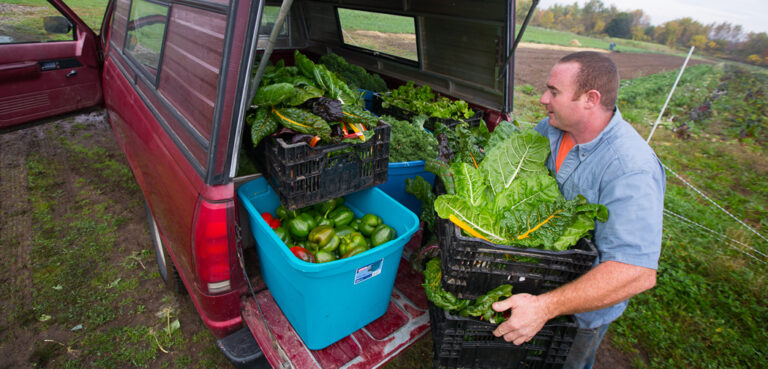From College Farm to Cafeteria Tray
College Farms Are Part of a Growing Trend

Colleges and universities are embracing the popular “eat local” philosophy by establishing programs to grow fruits and vegetables and raise livestock, then providing the fruits of their labors to their dining halls.
This student-driven trend is an effort to produce healthy, locally grown foods for their communities while learning about the environment and sustainable growing practices.
“These students want to create a more sustainable world, and they’re helping campuses connect more deeply with our foods,” says Dr. John Gerber, a professor in the University of Massachusetts’ Stockbridge School of Agriculture.
Not Just Farming Around
[[{“fid”:”15089″,”view_mode”:”default”,”fields”:{“format”:”default”,”field_file_image_alt_text[und][0][value]”:””,”field_file_image_title_text[und][0][value]”:””,”field_byline[und][0][value]”:”Photo by John Solem”,”field_description[und][0][value]”:”Amanda Brown”,”field_place_ref[und][0][target_id]”:””},”type”:”media”,”attributes”:{“class”:”media-element file-default”}}]]
Participants in the University of Massachusetts’ Student Farming Enterprise Program, now in its ninth season at the school’s flagship campus in Amherst, are responsible for developing production plans, choosing crops, growing plants and then marketing them. Amanda Brown, a lecturer in the program, says the student farm supplies hundreds of pounds of organic veggies to the UMass dining commons each week during growing season, including carrots, potatoes, tomatoes and leafy greens. The program also sells its produce to the Big Y supermarket chain, on campus at Earthfoods Café and a farmers market, and through sales of Community Supported Agriculture (CSA) shares.
“These are not just a bunch of kids messing around on a farm,” Brown says. “We offer a hybrid of education and production.”
Farms Are Working Classrooms
With a student body of 850, Warren Wilson College is a far cry from a large university, yet its farm is well known in national agricultural circles. The North Carolina school, along the Swannanoa River, is nearly self-supporting and has been growing its own foods for much of its 121-year existence.
“Back when we were the Asheville Farm School, self-sufficiency was important to feeding the student body,” says Chase Hubbard, Warren Wilson College Farm manager. “And a farm is an exceptional theater for teaching basic work habits like problem solving, time management and efficiency, which will benefit any future endeavor.”
Warren Wilson’s sustainable agriculture farm is one of many student work crews that support the operation of the college, which has won numerous sustainability awards. The farm consists of 275 acres of mixed crops and livestock. Each year, the school cafeteria serves about 15,000 pounds of the farm’s grass-fed beef, pork and chicken, and also sells about 15,000 pounds of beef and pork annually to the local community.
Cafeterias: A Locavore’s New Frontier
The programs at UMass and Warren Wilson are part of a fast-growing trend that also extends to younger students – a 2011-2012 U.S. Department of Agriculture survey found that 44 percent of U.S. public school districts have Farm to School programs in place, and many are organizing schoolyard gardens.
“Students are requesting that their foods be locally grown, and they want to be part of this food revolution,” Brown says.
In cafeterias across the country, detailed signs tell diners the origins of their foods. Joanna Benoit, sustainable food systems coordinator for UMass Dining, says students, faculty and staff are passionate about knowing the names of local farms, and how far their food has traveled to them.
“It makes it more real and exciting if you know that the tomato you are about to eat came from the student farm,” Benoit says.
“These students want to create a more sustainable world, and they’re helping campuses connect more deeply with our foods.”
